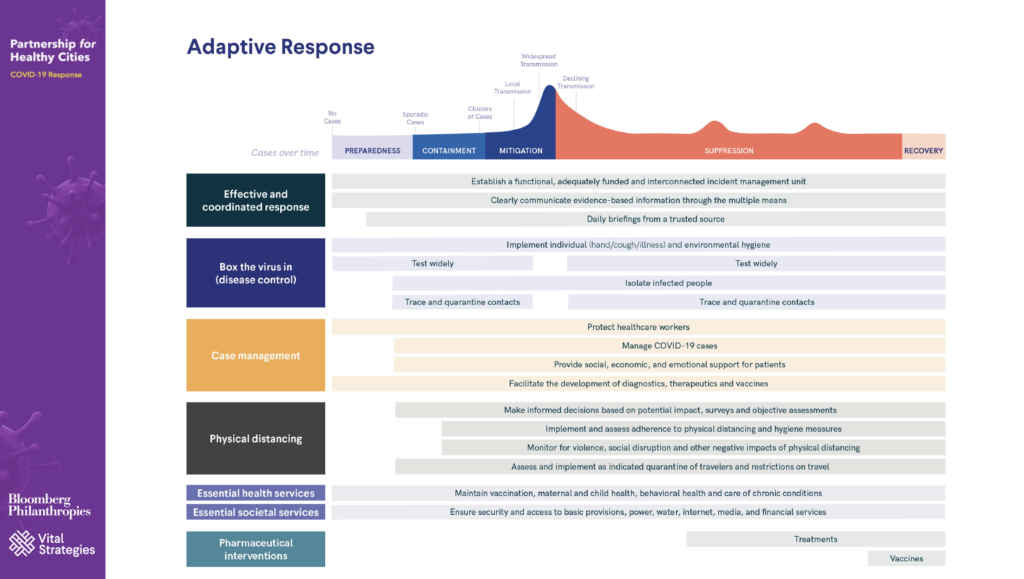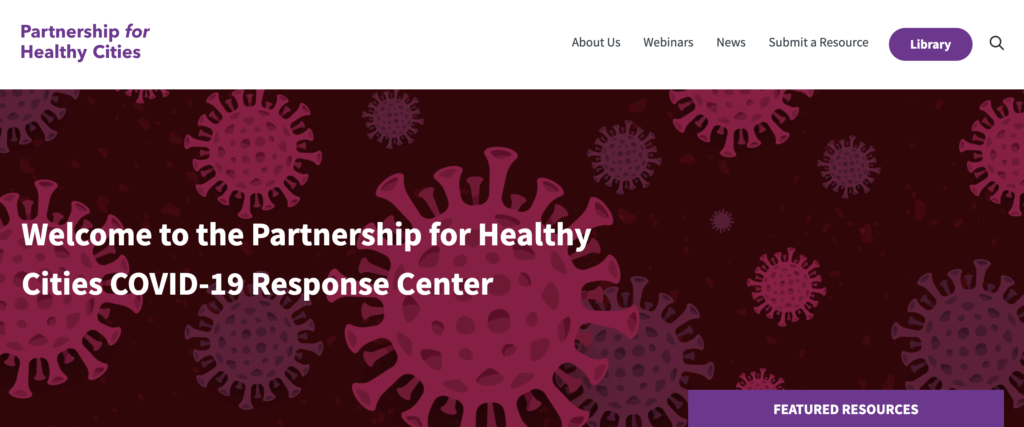With the COVID-19 pandemic sending shock waves through cities worldwide, strong and informed local leadership is crucial. The Partnership for Healthy Cities is offering a range of technical support to its global network of 70 cities to boost their local response to this global crisis. Two new components launched this week: the Partnership for Healthy Cities COVID-19 Response Center and the Bloomberg Philanthropies Partnership for Healthy Cities COVID-19 Global Leadership Series.
The latter is a series of webinars for city executives and technical teams, conducted in English, French and Spanish. Each session features updates on the evolving science, expert briefings on urban public health strategies, and opportunities to share experiences and ask questions about on-the-ground concerns.
The webinar on April 16 convened 192 technical leads from 31 cities to discuss the COVID-19 adaptive response framework – guidance for deciding when and how to implement public health and social measures (PHSMs) such as physical distancing at the city level.

Amanda McClelland, Senior Vice President for the Prevent Epidemics program at Resolve to Save Lives, an initiative of Vital Strategies, introduced the framework and its central tenet: local situational assessment for managing disease control, social measures, and strong risk communication. She emphasized the importance of PHSMs to reduce the number of cases at a pandemic’s peak, allowing health facilities to attend to a manageable number of patients without reducing the standard of care.
“People need to understand the spirit of these public health and social measures, not just what they’re being asked to do, but why.”
– Nandita Murukutla
Nandita Murukutla, Vice President of Global Policy and Research at Vital Strategies, spoke about strategies for mitigating the economic and social disruption caused by PHSMs, such as strong two-way communication with local communities. Early and consistent interaction with faith and other community leaders is key to the challenge of balancing public health needs with such disruptions. As cities begin reducing PHSMs and re-opening, sustaining community-level contact will be essential in monitoring new rates of virus transmission and socializing the reintroduction of new measures, if needed. “Decision-makers will have to stay alert for when it might be necessary to tighten restrictions again,” said Murukutla.
The webinar also served as an introduction to the Partnership for Healthy Cities COVID-19 Response Center, an online platform sharing the latest city-focused practical guidance and tools to support cities in four technical areas:
- Disease surveillance and epidemiologic analysis;
- Risk communication and public information campaign development;
- Legal authority analysis and guidance; and
- Public health and social measures.
Dan Kass, Vital Strategies’ Senior Vice President for Environmental Health, took participants on an online tour of the new web-based platform, which provides cities access to information and support geared specifically toward urban challenges, ranging from maintaining city services to implementing critical public health measures, for cities at every stage of the epidemic. The web platform also encourages city-to-city sharing of best practices and real-world experiences with COVID-19.

Explore the Partnership for Healthy Cities COVID-19 Response Center at: www.cities4health.org
About the Partnership for Healthy Cities:
The Partnership for Healthy Cities is a prestigious global network of cities committed to saving lives by preventing noncommunicable diseases (NCDs) and injuries. Supported by Bloomberg Philanthropies in partnership with WHO, as well as Vital Strategies, this initiative enables cities around the world to deliver a high-impact policy or programmatic intervention to reduce NCDs and injuries in their communities. For more information, visit: https://partnershipforhealthycities.bloomberg.org/
The Partnership for Healthy Cities COVID-19 Response is part of the $40 million Bloomberg Philanthropies Coronavirus Global Response Initiative. By collaborating with the WHO and Resolve to Save Lives, an initiative of Vital Strategies, the Partnership for Healthy Cities COVID-19 Response is working hand-in-hand with the world’s leading experts on epidemic prevention.